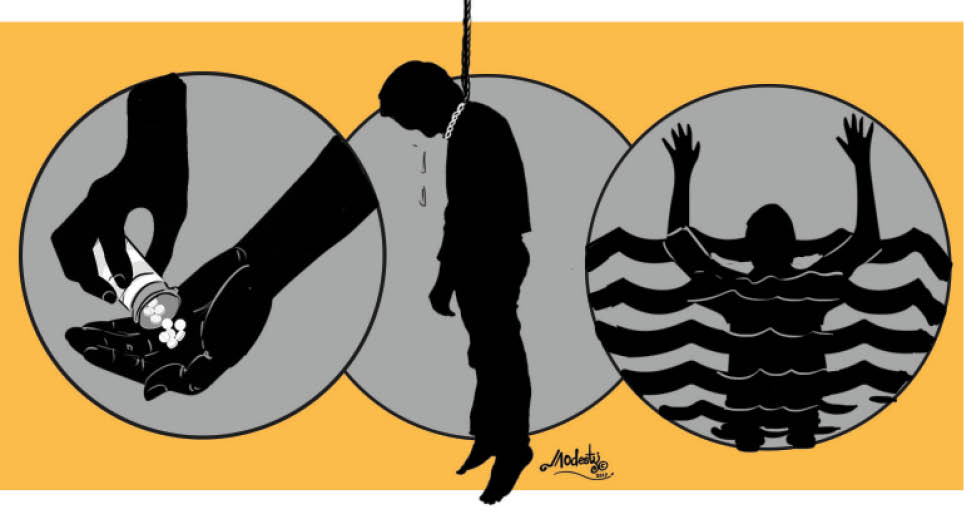How to tackle suicide rate among youths – Expert
In May 2019, a 400 level student of Religion and Culture at the University of Nigeria Nsukka (UNN), Chukwuemeka Akachi, committed suicide. In June 2019, another UNN final year student, Samuel Elias also committed suicide by drinking a poisonous substance. There was an attempted suicide by a 200 level student of the same University, Chinwendu […]

In May 2019, a 400 level student of Religion and Culture at the University of Nigeria Nsukka (UNN), Chukwuemeka Akachi, committed suicide. In June 2019, another UNN final year student, Samuel Elias also committed suicide by drinking a poisonous substance. There was an attempted suicide by a 200 level student of the same University, Chinwendu Odoh, in September last year. She drank Sniper but was rushed to the hospital and survived.
Akachi, Elias and Odoh are not the only youths who have died through suicide, attempted itwithin the last one year.
Experts say there is a disturbing increase in the number of suicides among youths.
Some of them jump from bridges, some hang themselves, and manysniper, a readily available insecticide, such that the product has been banned from the markets. Others continue to use various ways to end their own lives.
Dr Taiwo Lateef Sheikh, a Consultant Psychiatrist at Ahmadu Bello University, Zaria, said the rate of suicide attempts among adolescents is 12 per 100,000.
Our reporter had a chat with a psychiatrist based in Zaria who explained why there is rise in the incidences of suicide especially among the youth.
Dr Sheikh, who is also the President of the Association of Psychiatrists of Nigeria (APN), said the Suicide Research and Prevention Initiative (SURPIN), which partners with APN has found that about one-fifth of suicide cases seen at its affiliated institution are those aged 13-19 years. He added that 63.5 percent of youths aged 20-39 years were having thoughts of suicide out of which 28.2 percent of them were students.
“We found that the commonest mental health condition among those in crisis that called the hotlines for suicide was depression 36.5 percent, followed by drug abuse 20.0 percent. The commonest stressor was relationship problems 24.7 percent followed by health challenges 21.2 percent, financial 20.0 percent, then other stressors such as academic challenges,” he said.
He said studies have found that the suicide rate in Nigeria rises from 0.6/100,000 among those 14 years and younger to 6.9/100,000 among those aged 15 to 19 years.
While explaining that though suicide is not a new occurrence globally and locally, the psychiatrist however said it is worrisome that youth suicide may be on the rise. This, he addedwas troubling especially for a country like Nigeria that has a relatively youthful population, that make up a sizeable number and are the major productive age group.
“To lose them to suicide has grave consequences for economic growth,” said Dr Sheikh who is also a former Medical Director/CEO of Federal Neuropsychiatric Hospital, Kaduna, and a Harvard Medical School graduate.
The expert linked the increasing suicide rate in the country to lack of effective national suicide prevention strategies and non-passage of the mental health bill.
He explained that a comprehensive suicide prevention policy is a whole document that includes measures such as addressing social, psychological, mental health and infrastructural determinants which involve improvement in mental healthcare services.
Others, he said, are changing of laws, making psychological counselling accessible to those at risk, especially youths, and making suicide methods unavailable or difficult like improving the design of our bridges, roads and rail lines.
Also included are restricting access to chemical agents used to commit suicide and firearms, changing the ways the media report suicide and making it not only patients’ friendly but use reporting of suicide to educate the public, among others.
The psychiatrist noted that the passage of the mental health bill on its part, will promote mental well-being, prevent mental illness and guarantee universal access to effective, affordable and culturally acceptable mental health care services for the country.
He said it was also important to develop programmes that would address stigma towards suicide, decriminalize suicide and treat persons who attempt suicide in humane and compassionate manner.
To curb suicidal trend in the country, Sheikh said addressing mental illness and psychosocial disabilities through implementation of national mental health service delivery policy and passage of the mental health bill are the first step in comprehensive suicide prevention strategy for Nigeria.
He added that decriminalising suicide will encourage those who are suicidal to voice out and seek help.
According to him, only about 300 psychiatrists in Nigeria are serving about 200 million people. The number was linked to brain drain as there are 600 Nigerian trained psychiatrists in the United States of America and Europe.
“Remember that suicide can only be prevented, it cannot be treated! And this prevention is by identifying the determinants of suicide in our country and addressing them appropriately.
“There is considerable over-representation of mental illness (either unrecognised or poorly treated due to lack of access to treatment, medications or mental health professionals) and substance abuse among the causes of suicide in Nigeria,” he said.
The psychiatrist urged parents, guardians, schools and religious organisations to be supportive and compassionate to suicidal persons. “Don’t be judgmental, avoid negative criticism, avoid blaming, seek help of mental health professionals,” he said.
